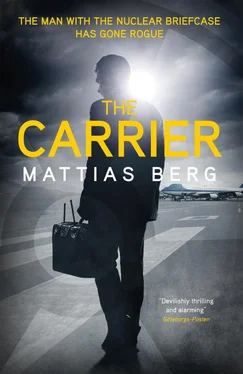Mattias Berg - The Carrier
Здесь есть возможность читать онлайн «Mattias Berg - The Carrier» весь текст электронной книги совершенно бесплатно (целиком полную версию без сокращений). В некоторых случаях можно слушать аудио, скачать через торрент в формате fb2 и присутствует краткое содержание. Город: London, Год выпуска: 2019, ISBN: 2019, Издательство: MacLehose Press, Жанр: Триллер, на английском языке. Описание произведения, (предисловие) а так же отзывы посетителей доступны на портале библиотеки ЛибКат.
- Название:The Carrier
- Автор:
- Издательство:MacLehose Press
- Жанр:
- Год:2019
- Город:London
- ISBN:978-0-85705-788-4
- Рейтинг книги:4 / 5. Голосов: 1
-
Избранное:Добавить в избранное
- Отзывы:
-
Ваша оценка:
- 80
- 1
- 2
- 3
- 4
- 5
The Carrier: краткое содержание, описание и аннотация
Предлагаем к чтению аннотацию, описание, краткое содержание или предисловие (зависит от того, что написал сам автор книги «The Carrier»). Если вы не нашли необходимую информацию о книге — напишите в комментариях, мы постараемся отыскать её.
The Carrier — читать онлайн бесплатно полную книгу (весь текст) целиком
Ниже представлен текст книги, разбитый по страницам. Система сохранения места последней прочитанной страницы, позволяет с удобством читать онлайн бесплатно книгу «The Carrier», без необходимости каждый раз заново искать на чём Вы остановились. Поставьте закладку, и сможете в любой момент перейти на страницу, на которой закончили чтение.
Интервал:
Закладка:
He finally drew the first question from Edelweiss.
“Would you like to tell us about the events out in the courtyard, Sixten? Describe what really happened here? Even though I know it will be hellishly difficult for you.”
Sixten said nothing for several moments, and out of the corner of my eye I noticed his quick glance at both Ingrid and me. Although he cleared his throat several times, his voice over the microphone remained thick.
“Yes, hellish is the right word, Joseph. Pretty much impossible, I’d say.”
So we all sat buried deep in his silence, almost drowning: ten seconds, twenty seconds, thirty seconds … The pressure mounted down here in the stuffy air of the lecture hall. What emerged at last was Sixten’s description of the events at Niscemi, detailed but accurate as ever, his grief over Aina’s death a powerful minor tone coloring it all. People can sometimes do that. Handle mixed feelings, play the contrast like one single instrument, sometimes in one and the same sentence.
When at last the interrogation proper started, Sixten’s role became clearer with each question. For example, the fact that he had waited so long for Ingrid to return to him. Ever since 4.03 p.m., October 23, 1988, as he said without a moment’s hesitation.
That was the moment when Edelweiss had contacted Sixten, since Ingrid was on her way to visit Stockholm for the first time in connection with our joint work on the dissertation. And since Sixten still remained on Edelweiss’ payroll.
It became clear that he had been Edelweiss’ eyes and ears in Sweden for more than fifty years. Not only during the almost twenty years after Sixten saw Ingrid for what he too thought would be the last time: when she was stopped at customs at Arlanda with Meitner’s californium—which, according to him, was also when Sweden’s nuclear weapons program ended. But also long before that. During the whole period of time from when Sixten, just eighteen years old, came to F.O.A. in Ursvik and became America’s clandestine tentacles in the worrying developments in Sweden, with Meitner as its priceless resource: the world’s leading nuclear physicist outside of the Manhattan Project.
Edelweiss wondered—just out of curiosity, he said, or maybe it was to emphasize Sixten’s loyalty for the rest of us listeners, who might not be as familiar with this distant spy’s travails—how much of his time had been devoted to watching over Oskarsson during these last decades. From the time he had been contacted about her in 1988.
It was during the time when Sixten was closing down his infiltration of the disarmament commissions as a member of the Swedish delegations, because Alva Myrdal and Inga Thorsson were no longer seen as opponents. When global détente was growing, leading in due course to the fall of the Wall and the spectacular collapse of the Soviet Union.
Sixten closed his eyes and counted. Then opened them again and formulated his answer.
“Well, my work relating to Oskarsson must have taken up roughly 40 per cent of my time, in total, over the last twenty-five years. Possibly as much as 45 per cent. Maybe even close to 50.”
I could not help smiling at all this pointless accuracy. Edelweiss began to describe a circle with his right foot. But it took a while for Sixten to spot it, that unfailing sign of impatience, as he spelled out his assignment in detail for those of us who did not know.
“During the later part of that period, when your concerns regarding not only Meitner’s activities but also Oskarsson’s grew, I started to lay out bait on some activist and similar sites which Aina also frequented, so that I could be confident that it would be just us who Oskarsson would get in touch with—when at last she made her long-planned move. But most of my work involved keeping all of you on the other side of the Atlantic updated about Levine’s and Oskarsson’s work on the dissertation, trying to get a reasonable overview of the Swedish aspect: which archives she visited, the people and institutions she contacted and so on. At that time I think I was working more than full time on Oskarsson. I’d say about a 110–115 per cent, from the moment when she finally made contact with me on October 25, 2008, forty years to the day after we were separated. When she took the bait.”
I looked at Sixten, tried hard to understand how far one might be prepared to go just to find relevance. Whether it had ever been out of some sort of conviction.
Zafirah took over the interrogation, cut straight to the point.
“And why did you sacrifice Aina?”
Sixten stared at her. Frozen. As if he had not understood.
“Sacrifice?” he repeated.
Then rolled the word around on his tongue a few more times, as if it were foreign to him. As if his English was less than perfect—as if he had never heard the expression before.
“I assumed it would be enough for me to slip a sleeping pill into her tea, lock her in the kitchen.”
We sat in silence, interviewers and interviewees, on the podium as well as in the audience. Sixten leaned forward and drank from the plastic cup on the lectern in front of him. Again I was counting the seconds. Twenty, twenty-one … The pressure built, a whistling grew in my ears, before he continued.
“There were provisions there, stockpiles of both food and drink. And she could sleep on the kitchen sofa. I did not expect to be away for more than a few days, so Aina would still be in good shape when I got back. She would have had to find a way of dealing with her bathroom needs. But we don’t in any case shower more than a few times a week, these days, either of us.”
After a long, renewed silence—upward of a minute at least—it was Zafirah who spoke, glancing in the direction of Edelweiss, with a blunt follow-up question.
“I’m afraid I don’t understand, Sixten. Enlighten us.”
“Well… This isn’t easy for me, you know.”
“Try.”
“So… the night before I was due to leave, there was this desire between us, for the first time in many years: as if Aina had sensed that this might be the last night… for me. It was then that I saw the tattoo on the inside of her left thigh. And bearing in mind what Ingrid had revealed to me, it wasn’t that hard to put two and two together. To work out that my adored wife was the key to the whole of Plan B., what Ingrid had termed the ‘Needle in the Haystack’.”
Ingrid cleared her throat. Just that—cleared her throat—and let Sixten continue.
“But I had to leave so early in the morning and couldn’t think of any reasonable alternative. So I locked the door on her just after she had kept me company with a quick cup of tea. And I am pretty sure that there’s only one key to the kitchen. And the window panes would not have been easy to break, with the type of protective glass I’ve had put in, not without special tools. Yet still she managed to get out of there. My stubborn little Aina.”
The last part of what Sixten said was barely audible. One of the two new Kurt-or-Johns went to the very back of the enormous lecture hall and turned up the volume of the loudspeakers.
“And you know how it ended, of course… the dreadful thing that Levine did, which I was forced to witness just before you and I had to make our way down into the tunnel system, Zafirah. I recognized my beloved at first sight, even in that costume. My own Alva Myrdal…”
I stared straight ahead, felt Sixten’s wordless fury and grief from the side. Knew so well that one can live both sides of a double life with equal passion.
Then it was Ingrid’s turn to be questioned—and Edelweiss took over.
“First of all I would like to thank you, dearest Ingrid, for helping us start the reboot here in Niscemi. We can reverse your little plan, have the digital footprint of your code sequences, can find the patterns. I don’t think it will take us too long to decipher them, put the weapons system back in place again. We may even disable the briefcase without your assistance. Although we would much rather have it—together with the names of your helpers around the world. So we can now once more defend ourselves with the ultimate means, if the same thing is used to attack us. God help us…”
Читать дальшеИнтервал:
Закладка:
Похожие книги на «The Carrier»
Представляем Вашему вниманию похожие книги на «The Carrier» списком для выбора. Мы отобрали схожую по названию и смыслу литературу в надежде предоставить читателям больше вариантов отыскать новые, интересные, ещё непрочитанные произведения.
Обсуждение, отзывы о книге «The Carrier» и просто собственные мнения читателей. Оставьте ваши комментарии, напишите, что Вы думаете о произведении, его смысле или главных героях. Укажите что конкретно понравилось, а что нет, и почему Вы так считаете.












